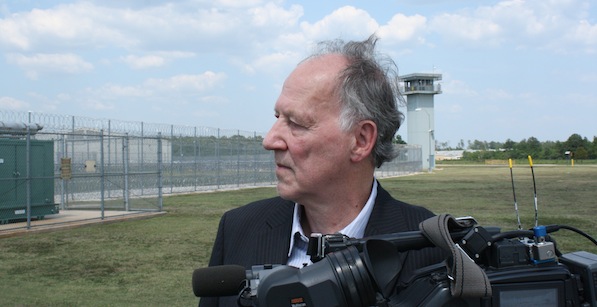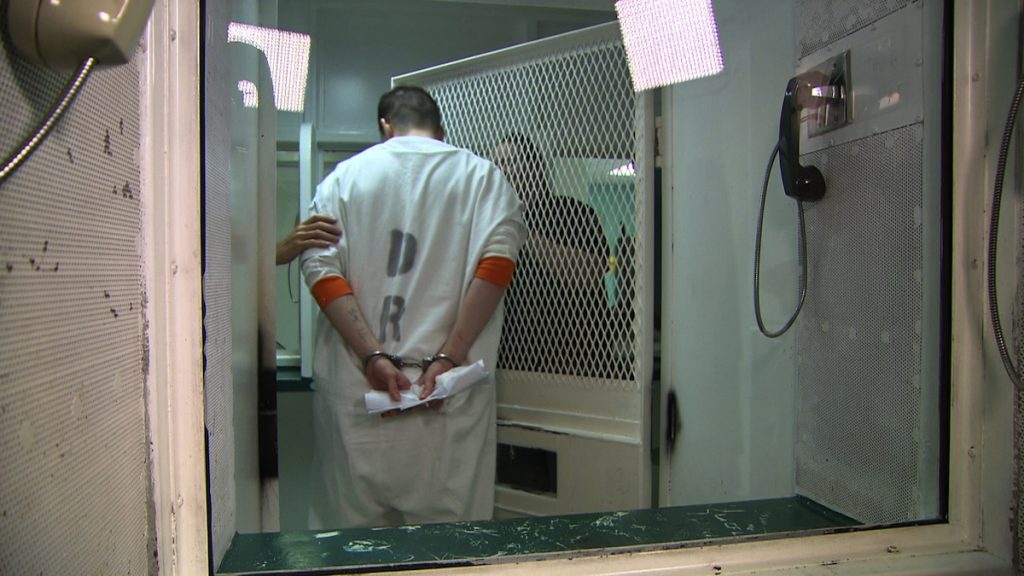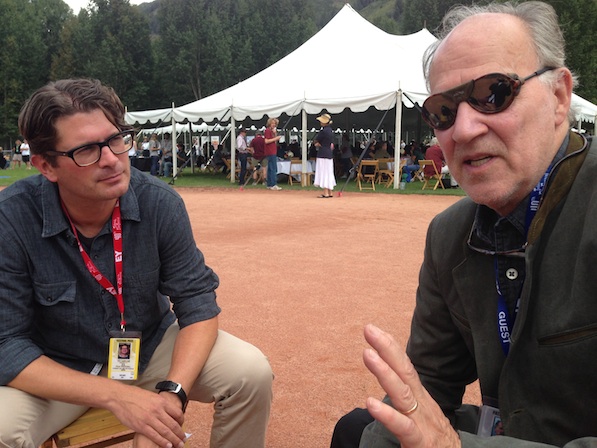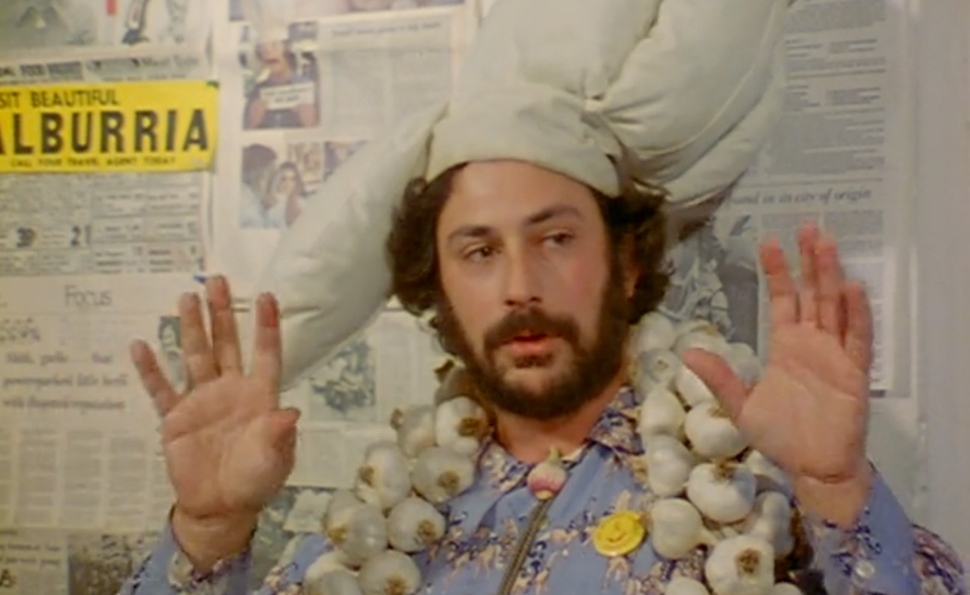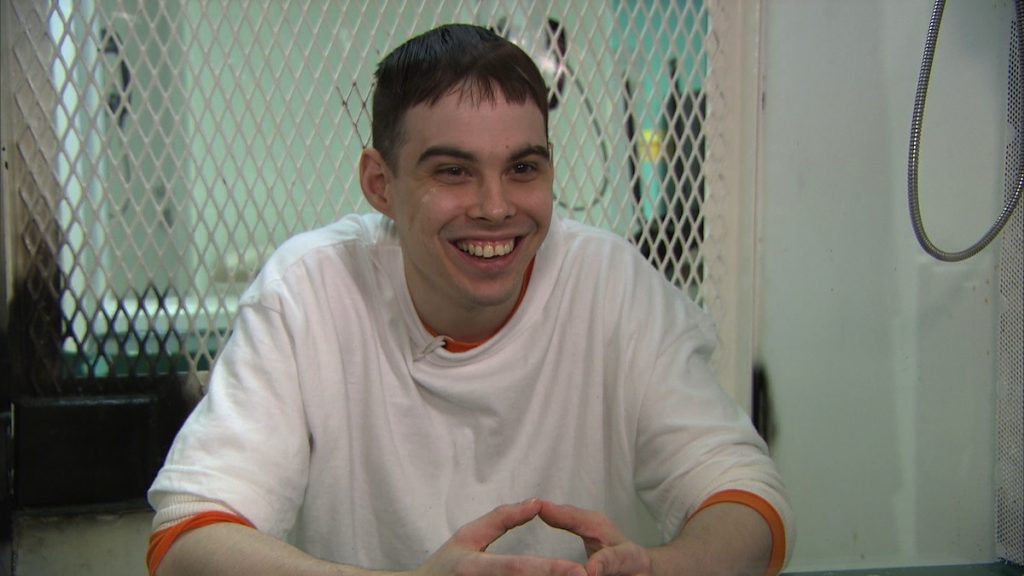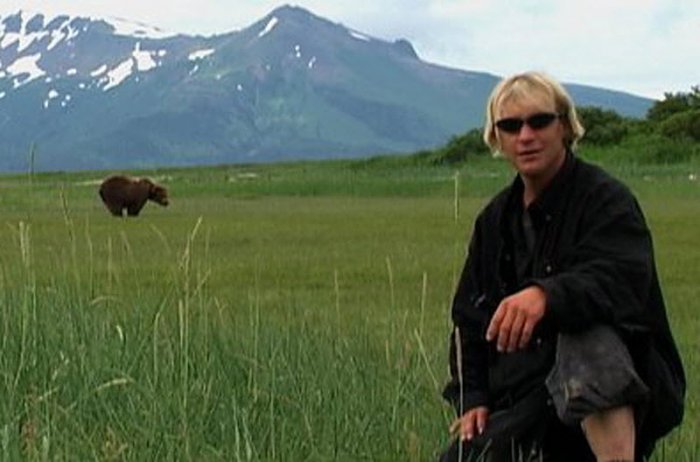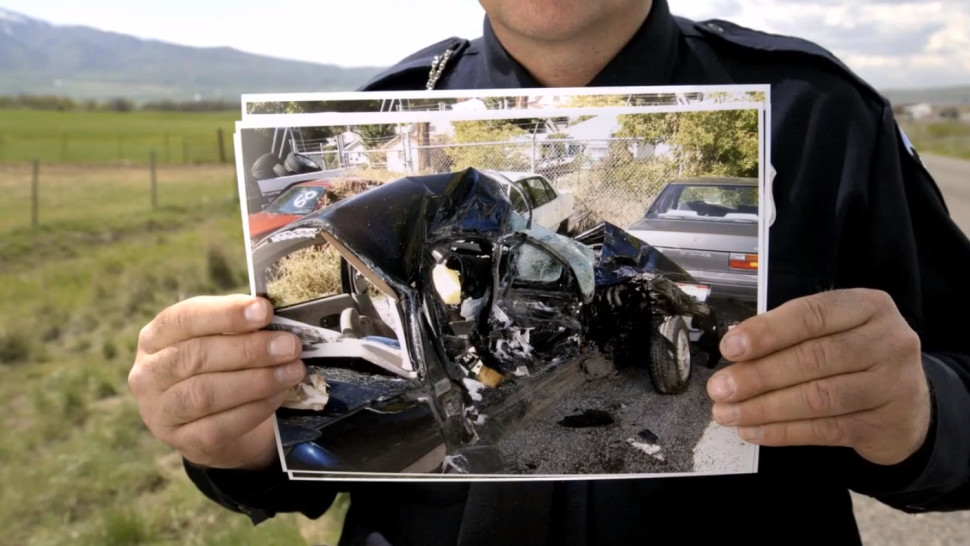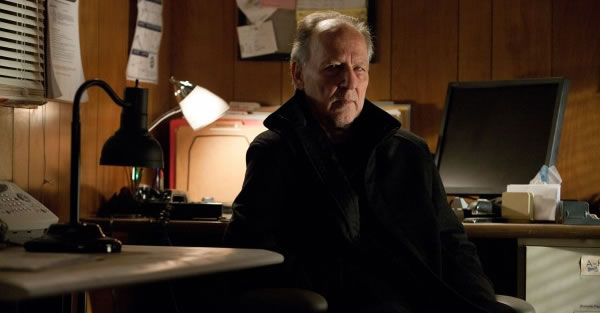By now, Werner Herzog has given more than one thousand interviews. And yet he continues to fascinate. The intensity of his engagement and the persistence of his vision are not only what distinguish his interviews but also what make them so memorable.
We recently sat down with him at the Telluride Film Festival, just outside the newly christened Werner Herzog Theater. With 650 seats and a state-of-the-art sound system, it equals the size of the Palm as one of the festival’s largest venues. A converted ice rink for the town of Telluride, the theater’s lobby is plastered with gigantic portraits of the director, one of them twenty feet tall. Inside the theater (and prior to every screening) there is a running slide show of photos shot on location which show the making of his many films: Fata Morgana, Even Dwarfs Started Small, Stroszek, La Soufrière, Nosferatu, Fitzcarraldo, The Dark Glow of the Mountains, Cobra Verde, Lessons of Darkness, Little Dieter Needs to Fly, Encounters at the End of the World and others. The theater was officially dedicated with a screening of Aguirre, the Wrath of God. At once monumental and ephemeral—the entire theater will be packed up and reassembled every Labor Day weekend—it is a fitting tribute to Herzog, his relationship with the festival and the significance of his work.
Herzog first came to Telluride in 1975 and he has attended almost every year since. The festival’s co-founder and artistic director, Tom Luddy, was an early advocate of Herzog in the United States, at a pivotal moment in the filmmaker’s development. Since then, dozens of his films have debuted at Telluride. This year, he brought two new episodes of his “Death Row” series of profiles, which began with Into the Abyss (2011) and continue in the TV series “On Death Row.” Fandor’s Chief Content Officer Jonathan Marlow and I spoke with Herzog about these and other projects.
Jonathan Marlow: I was speaking with Errol Morris yesterday about how he, unlike most filmmakers, has a great ‘origin story.’ It originates with you and your prompting him to finish his first film. That kind of advice clearly is inspirational for many filmmakers. One should stop talking about making a film and just make the film.
Werner Herzog: I think it was only partially prompting him to finish a film. First of all, I pushed him into starting the film because he was full of complaints that production money wasn’t available and all sorts of subsidies dried up. And so I said to him, ‘Just start out with one reel of 16mm raw stock. Just start it and you will continue. But this time you have to finish what you are doing.’ Because he had already given up playing the cello. He was a very, very fine cello player and, from one day to the next, he gave it up. He also collected huge amounts of incredible material on mass murderers in Wisconsin where, later, I filmed.
Marlow: Regarding Ed Gein?
Herzog: Ed Gein, yes, but he never published it. And he gave up his studies at [UC] Berkeley and dropped that. I said to him, ‘Here is something that, if you start it, you’d better finish it, because I’m going to eat my shoes if you do.’ So it was just to dissuade him from quitting. It’s not as if I made Errol Morris a filmmaker. He is himself and he was always full of ideas. He just needed a tiny little nudge and a tiny little push to get him into it and stay in it. And that is maybe some sort of a quality he respects in me and he has adopted from me. He, the filmmaker, is self‑made. The man full of wild ideas that is Errol…it has nothing to do with me. But I’m proud that, in a small way, I was an element of courage for him.
Eric Ames: Did someone give you a nudge when you were younger?
Herzog: No, no one. And it was good like that.
Marlow: We’re sitting in the shadow of a theater that is named for you. I know you were reluctant to accept this honor, initially, but the Telluride Film Festival has obviously played a fundamental part in your life along with your friendship with Tom Luddy. You’ve been coming to this festival year after year and, obviously, Telluride has grown, the festival has expanded, and your filmmaking has changed over the years as well.
Herzog: You have to just put yourself into my shoes. It is some sort of an out‑of‑body experience, having a theater with your name a few steps away from here. But I accepted it very quickly because I knew it was the right thing. I have been one of the pivotal filmmakers for Telluride and I say that without any pride. I can quantify it. I have premiered at least thirty films here over thirty-nine years. It may have been thirty-five films. I’ve stopped counting.
Marlow: As you mentioned yesterday afternoon, you intend to premiere your latest film here next year as well.
Herzog: If it’s finished by next year. Whatever I have, I will bring here first. But let us say, if I finish a film in January, then I might show it in Berlin first. I don’t make films for festivals.
Marlow: No, of course not.
Herzog: But it is a chain of coincidences that I showed so many films for the first time here or for the first time in North America here in Telluride. And it is a natural thing that a theater bears my name. We have the Chuck Jones and it is a kind of real joy for kids and grownups of cinema. And Le Pierre, [named after Pierre Rissient,] a man who seems to live in the darkness of movie theaters and he projects out into the world the fantastic things he has seen. God knows where. Somewhere in Indonesia he digs up five fantastic films and he brings it to the world of Telluride. Telluride spreads it….
Ames: Far and wide.
Herzog: Far and wide, yes. What else? What other theaters do we have? There was the Max, named after Max Palevsky, a great, great friend of cinema and of this festival here. Max, unfortunately, passed away. We miss him. So the next theater should have the name of Les Blank or….
Marlow: It would be built in the center of a garlic field, perhaps.
Herzog: Yes. There has to be garlic next to the box office.
Marlow: Absolutely. Since you are screening two episodes of ‘Death Row’ here, I want to briefly discuss Into the Abyss and the ‘Death Row’ series. On what level do you feel that society and, in part, the legal system has failed these individuals? There is an essence of impartiality that’s supposed to be a cornerstone of the justice system. But the various prosecutorial teams that you interviewed have seemingly developed a narrative that does not seem to be entirely supported by the facts. This gravitation toward absurd concepts of ‘evil,’ for instance, which are then applied without prejudice…
Herzog: We should be careful. I would not agree that the legal system has failed them. It’s a much bigger….
Marlow: Society has failed them, in the sense that….
Herzog: Yes. Because, you see, the guilty verdict was correct in all the cases that I covered, without any doubt. There’s such overwhelming evidence and quite a few of them actually confessed to their crimes. One in Florida, James Barnes, confessed on camera to two more murders that he committed. He didn’t want to speak to law enforcement anymore. He wanted to talk to me. He liked me and had a certain confidence. Of course, it doesn’t matter for him. He will be executed. There is little doubt. Whether he’s going to be executed for one murder or for three or for fifteen, it doesn’t matter that much. I made it clear to all the inmates on death row that I’m not in the business of guilt or innocence. That’s what a court of law does. I also said to them, in writing, my film is not serving as a platform for you to attempt to prove your innocence. I am not in that business. I am not doing an activist film. It is more something like looking deep into the abysses of the human soul. The trials were fair. In the cases that I saw, it was fair. In the case of Robert Fratta, fifteen years after his conviction, the conviction was overturned for reasons that are really shaky. There was a co‑defendant, actually the trigger man, whom he had hired through an intermediary. The trigger man confessed and we have the confession on tape. Every single time the camera is switched on, he’s briefed on his Miranda rights. An appeal judge fifteen years later says, ‘Well, he was coerced.’ When you look at the tape, there was no coercion. But the system has been so fair that Fratta was retried and the trigger man was retried without this taped evidence. Both of them were sentenced to death again. Here comes the problem. I have to say this as a German coming from a different historical background. I ask you to understand my position.
Marlow: It is a position that I share, actually.
Herzog: Then it is easy to explain. Actually, I explained the same thing to the guards and to the warden, who were all in favor of capital punishment. I said to them, ‘You have to understand that I am a German. During the time of the Nazi barbarism—and I was born at the end of this period—there were tens of thousands of cases of capital punishment. You could be hanged, and it happened, for telling a joke on Hitler.’ Parallel to that systematic program of extermination (or euthanasia if you were insane or severely retarded), the state would deem your life ‘worthless life’—in German, unwertes Leben. It’s a horrifying term. You would be executed. And the genocide of six million Jewish people, of course….
Marlow: …and gypsies and homosexuals…
Herzog: …dissidents, gypsies and so on. Let’s say ninety-eight percent in my rough estimate were Jewish people. That’s genocide and an atrocity that the human race has never seen on a scale like that. Coming from there, I still do not have an argument against capital punishment. I only have a story, the story of the Nazis. When I tell you that, I can only say, ‘end of story.’ I still don’t have an argument. And they all understand it and they all respect me. The guards, for example, who would pull your plug [for the recording equipment] from the electricity after exactly fifty minutes, the guard would look at me and have his hand very softly on my shoulder to let me know, ‘Well, your time is almost finished…’ But then he would give me another five minutes and nod. I knew that the time was up but he was trying to be kind with me. The guards, which they normally would not do, handed over a lavaliere, a remote microphone, into the little booth where the prisoner would speak behind bulletproof glass. Normally, you have to speak through an old fashioned telephone. And the sound is very, very bad. The conversation is not as free. The man opposite to you cannot gesticulate. He cannot flail his arms. He cannot, somehow, forget for a half-hour or so that he or she is on death row.
Ames: Some would say that there is a problem with giving convicted killers a microphone. Why should we listen to them?
Herzog: Because I think there is a subversive element in there about capital punishment which I do not address as an activist. Secondly, it is very easy to dismiss them as leaving them their voice. It would be dehumanizing to them, and it happens very easily. When you are around in rural Texas, they say, ‘Why do we even give them a trial? Just hang them high.’ That is what you hear everywhere. Of course they have the right of a trial. I have seen some of the most unbelievable and monstrous crimes, and yet I maintain that the perpetrators are not monsters. They’re still within the definition of what I consider human beings. One of the district attorneys or prosecutors in one case, [that of Blaine] Milam, says his crime was so atrocious that he has left the common ground of humanity. He is not going to define what we are as human beings. ‘We have to exterminate him.’ It is the same argument of the Nazis about insane people. ‘They are worthless. They are outside of humanity. Jewish people are outside of the human race, it is an ugly, subhuman sort of race.’ And I immediately say I disagree. I disagree. I believe it is an important statement. I give them a voice because I somehow maintain their humanity. They do not have to face a trial anymore. They have been sentenced to die and they are not bragging about their crimes.
Ames: There is something about that knowledge that interests you.
Herzog: Yes. Where are the deepest crevices of the dark human soul? Cinema is very good for that. But I must say, I have looked very deep into these abysses and you get dizzy. You get vertigo when you look too deep into it.
Marlow: You mentioned yesterday that you started smoking again during the editing process of these last four episodes. You’ve since stopped.
Herzog: Only during the editing, yes. When you are filming, you have to deliver. You have fifty minutes and you just do it. You have to perform and you have to be absolutely alert. You have to find the right voice immediately. Of course, I’m not coming with a catalog of questions like a journalist. It’s something else. I have to stretch out my feelers and find the right voice. Like with Milam, he says to me, ‘Oh, I’m on F‑Wing, punitive wing,’ and I immediately know… Of course, prisoners cannot have any fights because they’re in seclusion, in solitary confinement. Even when they are out in the yard for one hour—twenty-three hours locked away in solitary and then one hour in a yard—they are in cages like for dogs, mesh wire cages, so they can’t fight each other. The only conclusion I had immediately was that an altercation with a guard had put him on the punitive wing. He says, ‘No, no, no. I was caught with wine. Self‑made wine.’ That really made me curious. Finally, he says, ‘Oh, yeah. Well, I just do it…’ and I say, ‘Confess!’ [Laughter.] He laughs and, all of a sudden, he describes how he makes his own hooch, this illegal wine that he makes of prunes and which is not good for you and it tastes like chalk. And so, suddenly, he’s completely oblivious that he is going to die fairly soon and that he is on death row. All of a sudden you see a human being that committed a crime which is beyond description. You cannot describe it. Even the hardened homicide detective falls silent when he thinks back at the crime scene that he saw when he saw the victim, a toddler girl….
Marlow: Yes. It is horrific.
Herzog: And it is beyond what they have ever seen. This homicide detective had thirty-eight years on the beat, and he told me later his five colleagues on the crime scene—together, in sum, had more than one-hundred years of expertise, plus his almost forty years of expertise—they had never seen anything like this before or after. And then he falls silent. I went with him through the crime scene photos, because it was a very strange staged crime scene with fake blood. The perpetrators did some crazy staging of a crime scene and I said, ‘Keep the pictures of the victim out [of view].’ And they projected them for me on a wall in a police station. They hadn’t deleted a few of the pictures of the little girl, and I must say what I have seen I do not want anyone to ever have to see.
Marlow: It cannot be unseen.
Herzog: Even my worst enemies should not see what I have seen.
Ames: It seemed like you were using a very elliptical, very evocative style there, because it is a story that the audience does not want to hear or see directly.
Herzog: You don’t hear it. And the stunned silence of this very solid, down-to-earth homicide detective has much more power than seeing an image in graphic detail.
Marlow: Such as the use of silence in Grizzly Man. To what extent is it important whether you actually listen to the tape or not? The concept of listening to the tape is powerful enough that the reality of whether it is heard is less intrinsic than the idea.
Herzog: Again, you have not heard what I have heard. And what is on the tape is truly horrifying. Nobody must hear what I have heard. There are certain things that you have to respect, and there has to be respect for the dignity of an individual’s death and the privacy of that person’s death. This is the reason why you’d never see videos that were taken during the attacks of 9/11, where people jumped from the 104th floor. There is material but you will never see it, hopefully, and you should never see it. I do not want to see it, because those are human beings in their moment of death. You’d better respect it. So that is a very simple reason. And we don’t need to see and hear everything.
Marlow: I am thinking of Robert Bresson’s Pickpocket, for instance, where an entire racetrack is evoked by what you hear. When you ask the audience what they have seen, they seem to believe that they’ve seen things that are never shown. You are using something that is exactly the opposite in the sense that you’re evoking something that is constrained to the imagination and is undoubtedly terrifying, while your words are saying, ‘This is something that you should never hear.’
Herzog: This is only a secondary argument. The primary argument is respecting the persons who were killed and mauled and eaten by a bear.
Ames: But in other films, and for very different reasons, there are some wonderful acts of withholding. I’m thinking of the ‘pilgrimage’ films, for example, when there is the divine or something alluded to which of course cannot be shown.
Herzog: Respect, again. Respect. In film, you see… The Internet has this kind of one-hundred percent indiscretion. It is a total indiscretion and discretion is not understood as a virtue anymore among the majority. In particular, it is not a virtue of young people who want to expose themselves. They have no problem if the surveillance camera films them everywhere because, if they are not on YouTube or the Internet, they do not exist in a way.
Marlow: It is a validation, in a sense, by way of omnipresent surveillance?
Herzog: I don’t know what it is. But there is a big shift in paradigm. For me, discretion is still a virtue.
Ames: You’ve often spoken about the medium of film in particular as expressing our collective dreams, our collective unconscious. But more and more people are obviously now drawn to the Internet and to social media. How does that augur for cinema’s future?
Herzog: I am curious about this huge shift, and I do not want to simply stay away from it. I am not nostalgic at all, and, of course, my very last work I have done for the Internet about texting and driving [From One Second to the Next], and nobody actually wanted the film. They wanted to have thirty‑second spots for TV. I delivered that. But on location I started to keep filming and they said, ‘That’s what we don’t need.’ They didn’t really want it that much. And I said I am continuing to film because it doesn’t cost any more. For every individual case of catastrophic accident I had one day of shooting. And I put together a longer film, and we had no idea what we would do with it.
It ended up on the Internet where it rightfully belonged and it will end up in high schools; 40,000 high schools in the United States will show this film. It has had many millions of viewers now while we are sitting here. At least two-and-a-half million have seen it on YouTube and Yahoo and other websites. I have, in a way, tried to understand the medium of, let’s say, YouTube or the Internet. I try to not completely stay in the nostalgic sulking position, ‘Yes, there should only be celluloid and there should be only cinema…’ and things like that. For example, I’ve done a live broadcast of a rock concert.
Ames: The Killers.
Herzog: Yes, The Killers. And it went straight out into the Internet. Or I’ve done a Kickstarter video for a friend of mine, Angelo Garro, an artisan blacksmith and a great cook. He did a film for Kickstarter and showed it to me. It was eight-and-a-half minutes long and very bad. I said, ‘Angelo, this is so bad that I have to…’ [Laughter.] He’s not offended when I say that. I said, “This is so bad. Give it to me. I have to cut it down. I have to write the commentary. I’m going to speak the text.’ And now, all of a sudden, we are something like five or six days away from the end of the two‑month period on Kickstarter and it has made over four-hundred percent of his pledge. It goes through the roof. So Kickstarter, it’s a completely new medium. I had no idea what Kickstarter was all about, and so I looked a little bit around. What do they do? How do you connect to the Kickstarter crowd? And I think I did it right.
Marlow: Evidently.
Ames: With the number of hits on From One Second to the Next, it clearly went viral. You’ve talked about new technology and your relationship to it. But this film has a clear educational purpose. It raises consciousness.
Herzog: That is the only purpose.
Ames: And yet, there is this interesting thread of forgiveness that runs throughout the film. I was wondering how that relates to raising consciousness.
Herzog: Because I did not want to show blood and gore and car wrecks and things like that. All of a sudden you see that the young people who committed these catastrophic accidents are very human and they’re deeply wounded by it as well. You have a moment of forgiveness that somehow takes you even deeper into these people and that is what changes your perspectives. I have not seen a single person who has seen the film who does not tell me, ‘I’ve given it up. I’m not going to text anymore.’ And a fifteen year old girl sent me an email which said, ‘I sat my mother down in the kitchen at the table and I told her, ‘Mom, you are texting when you take me to school. This is not going to happen again. Period.’’
Ames: But in the past you’ve taken a very clear stance against social-issue filmmaking. With the kind of public and personal reactions that have been conveyed to you about From One Second to the Next, does that at all affect your views on social-issue filmmaking more broadly?
Herzog: No. It is quite all right. It is totally legitimate. I never thought I would do anything like this. I was invited to do four thirty‑second clips for television and I said, ‘Yes, I can do that. But it would be much stronger if I had more time than that.’ All of a sudden, I could bring my expertise as a filmmaker into the whole thing, and it combines very well. It is more than just a social issue. It’s a deeper new perspective, something that really touches you very, very deeply. Only then is it going to be effective. It is not that I am going to become an activist filmmaker now. It’s a complete coincidence. But again, I am completely curious and I see that there is something coming at us with great vehemence. I have to tell you about one case which struck me more than any other, though I couldn’t film it. The perpetrator of an accident is in prison, and he was ready to talk to me on camera, but the prison authorities wouldn’t allow me to film, so that case had to be shelved. The case is interesting because it makes visible a real paradigm shift. A young man, nineteen years old, I think, is texting. He causes an accident, hitting a boy on a bicycle, who I believe died a week later. And he was texting with his girlfriend. And now comes this: the girlfriend was sitting next to him in the same car. So that’s a real shift now.
Ames: You see that at restaurants all too often.
Herzog: Yes, you see it. People who sit around a table and everybody is texting. There is something very big that is coming at us. And, not for nostalgic reasons, I don’t have a cell phone. I don’t have it for cultural reasons. I want to talk to you face-to-face. I want to have you so close that I can put my hand on your shoulder and let it sink in. And I want to hear your voice and I want to have a glass of wine with you or eat with you and enjoy it and laugh with you. When you text you are somehow in a parallel universe and you are separated from the immediate world around you. It is a cultural shift that I personally do not want to make.
Ames: In the James Barnes episode of ‘Death Row,’ you mentioned in passing, as part of a larger conversation, that you also—like the person you’re talking with—have a so-called bucket list. Could you tell us something that is on that list?
Herzog: I looked into cases that happened around the time Barnes was in specific locations and I dug up cases, unsolved crimes that looked very much like James Barnes crimes. After the conversation was over, at the end of the conversation, he said to me, ‘Well, there are five more.’ And I said to him—and it’s not in the film—’I do have some ideas about at least one or two who could have been.’ And he just… he was taken away already in shackles, and he just nodded in some sort of acknowledgment. With James Barnes, I certainly—even more than his murders for which he was condemned to death and the two murders that he spoke about on camera—I had a bucket list. I had done my homework.
Marlow: Does one of those include being a villain in a major Hollywood film?
Herzog: Well, I…
Marlow: If so, you can check that one off the list.
Herzog: No. I must say that I enjoyed being a villain on camera. I think I was paid for being frightening and I did the job well. I delivered.
Marlow: And was reading a children’s book one of those as well?
Herzog: No. You see, that was a pure coincidence, because my friend, Paul Holdengräber, who runs these public conversations at the New York Public Library—very high-caliber, wonderful programs—he had the writer and the illustrator of this children’s book, and he said to me, ‘Werner, please record it. You can do it over the phone, and I will play it to the audience.’ And I said, ‘No, no, no.’ And three weeks later he came back again and I said, ‘No.’ And then, only two days before the event, I was editing. I always have a fairly good microphone to do a test version of commentaries. And I said to my editor, ‘Let’s just switch off the system and just let me read it.’ I read it in six minutes. I did it well and it was played for the audience. And now I think it’s even officially available…
Ames: I think it is.
Herzog: …because there was an actor… What is his name?
Ames: Samuel L. Jackson?
Herzog: Samuel L. Jackson read it, too. But I am convinced I read it better.
Marlow: I think you have one of the most distinctive and recognizable voices in all of cinema.
Herzog: But it is the articulation of the voice, the despair in the voice. ‘Go the fuck to sleep.’ [Laughter.] This is not directly cinema-related but, when you speak about acting or doing something for YouTube, it’s all cinema‑related. I love everything: writing, directing, acting. You just name it.
Marlow: As a last note, the film that you mentioned the possibility of premiering here next year, can you say anything about it? I know that you travelled here from Syria. Is that involved at all?
Herzog: No, no. You cannot film in Syria at the moment. But let me put it this way. I regret that I said it. In the best‑case scenario, even if I start fairly soon with production of the film, I probably won’t be technically ready until after the next Telluride. It was more a slip of the tongue that I said that. But, yes, if I have something finished, I will come here.
Ames

